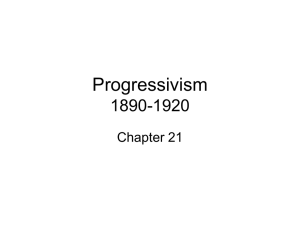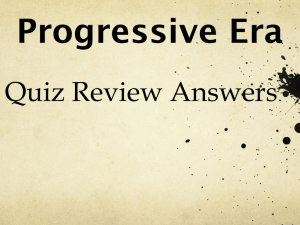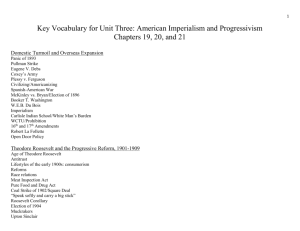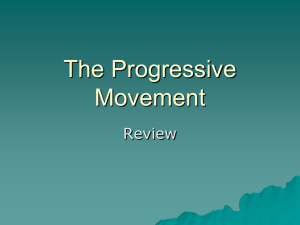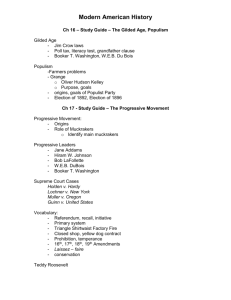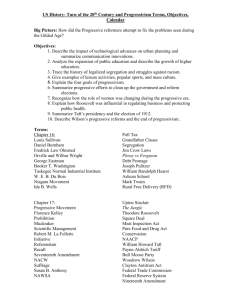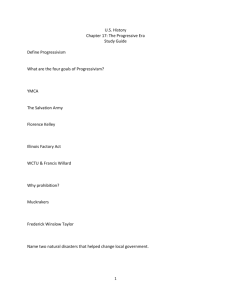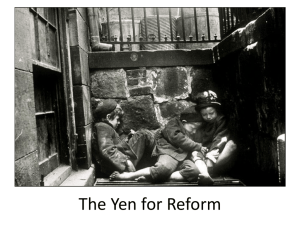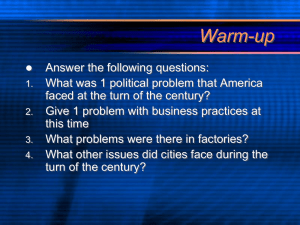Chapter 18 Imperialism and America Section 1
advertisement
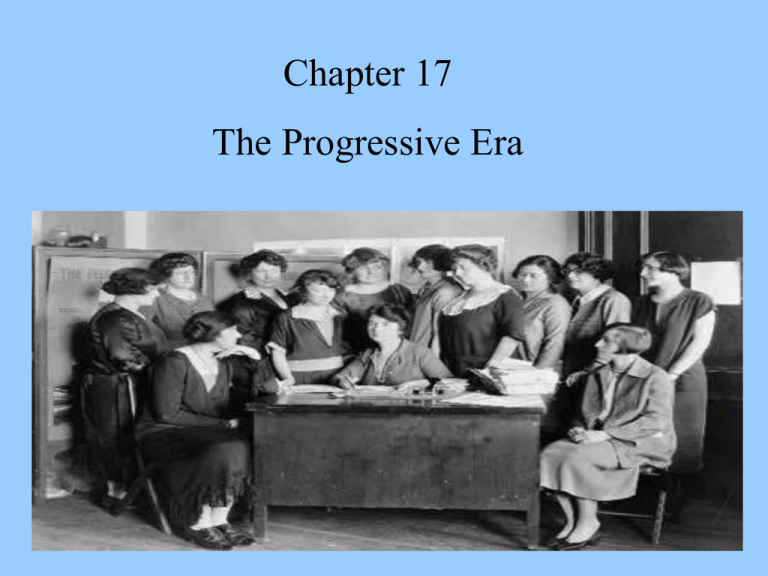
Chapter 17 The Progressive Era Progressivism or Progressive Movement – Reformers, who aimed to return control of the government to the people, restore economic opportunities, and correct injustices in American life. Four Goals of Progressivism: 1. protecting social welfare – the YMCA and Salvation Army are examples of organizations that assisted in this area. Florence Kelly became an advocate for improving the lives of women and children. 2. promoting moral improvement – reformers wanted personal behavior to improve. Prohibition, the banning of alcoholic beverages, was one such program. Four Goals of Progressivism: 3. creating economic reform –many workers began to embrace socialism. Muckrakers were journalists who wrote about the corrupt side of business and public life in mass circulation magazines during the early 20th century. 4. fostering efficiency – progressive leaders wanted experts to make the workplace more efficient. Scientific Management was the application of scientific principles to increase efficiency in the workplace. Muckrakers – journalist and other writers who dramatized the need for reform.Their investigations uncovered a wide range of ills in America in the early 1900’s. (a muckrake is a tool used to clean manure and hay out of an animals’ stable) Lincoln Steffens – editor of McClure’s, a magazine known for uncovering social problems. He published The Shame of the Cities, a collection of articles on political corruption. Jacob Riis – a photographer for the New York Evening Sun. He photographed crowded, unsafe, rat-infested tenement buildings. He published, How the Other Half Lives. Upton Sinclair – wrote, The Jungle where he reveled the unsanitary conditions of the Chicago stockyards. Reforms Social Gospel Movement – preached salvation through service to the poor. Settlement Houses – community centers in slum neighborhoods that provided assistance to people in the areas. Jane Adams – one of the most influential members of the movement. She along with Ellen Gates Starr founded Chicago’s Hull House. Reforming Elections Direct Primary – an election in which citizens pick candidates themselves vote to select nominees for upcoming election. Initiative – a bill originated by the people rather than lawmakers-on the ballot. Referendum – the voters, not the legislature, accepted or rejected the initiative. Recall – enabled voters to remove public officials from elected positions by forcing them to face another election before their term was up. Women Make Progress Florence Kelly – believed that women were hurt by the unfair prices of goods they had to buy to run their homes. National Consumers League (NCL) – Kelly helped found this organization which is still active today. Pushed for labels, working conditions and payment for unemployment. Temperance Movement – led by the Women’s Christian Temperance Union (WCTU). They promoted the practice of never drinking Alcohol. They also pushed for laws to help mothers keep families safe and healthy. Margaret Sanger – believed that family life and women’s health would improve if mothers had fewer children. She opened the first birth-control clinic. She was jailed as a “public nuisance” several times. Suffrage – the right to vote Carrie Chapman Curtis – She studies law and was one of the first female school superintendents. She traveled around the country urging women to join the National American Women’s Suffrage Association (NAWSA). Alice Paul – she was known as a social activists, these women grew more daring in their strategies to win the right to vote. Nineteenth Amendment – this finally gave women the right to vote. On November 2, 1920 women were allowed to vote for the first time in a presidential election. Theodore “Teddy” Roosevelt became youngest president in American History at age 43 when McKinley was assassinated. Square Deal – This is what he called his proposed reforms. The goals were to keep the wealthy and powerful from taking advantage of small business owners and the poor. New Laws under Roosevelt: •Hepburn Act – railroads •Enforcing the Sherman Antitrust Act •Meat Inspection Act •Pure Food and Drug Act Environment – Yellowstone National Park is established in 1872. John Muir – His efforts led congress to establish Yosemite National Park in 1890. Gifford Pinchot – led the Division of Forestry in the U.S. Department of Agriculture. Changes in Water Policy •Los Angeles Aqueduct •National Reclamation Act – gave the federal government the power to decide where and how water would be distributed. William Howard Taft – Roosevelt used his power to get Taft elected, but they differed in their beliefs. This led to the Progressive Party in 1912. Woodrow Wilson – he became president after Taft and Roosevelt split the Republican vote. Lowering Tariffs & Raising Taxes Underwood Tariffs Act – cut tariffs, businesses could not over charge. 16th Amendment – created a graduated income tax. Federal Reserve Act – placed banks under the control of a Federal Reserve Board, which set up regional banks to hold the reserve funds from commercial banks.
